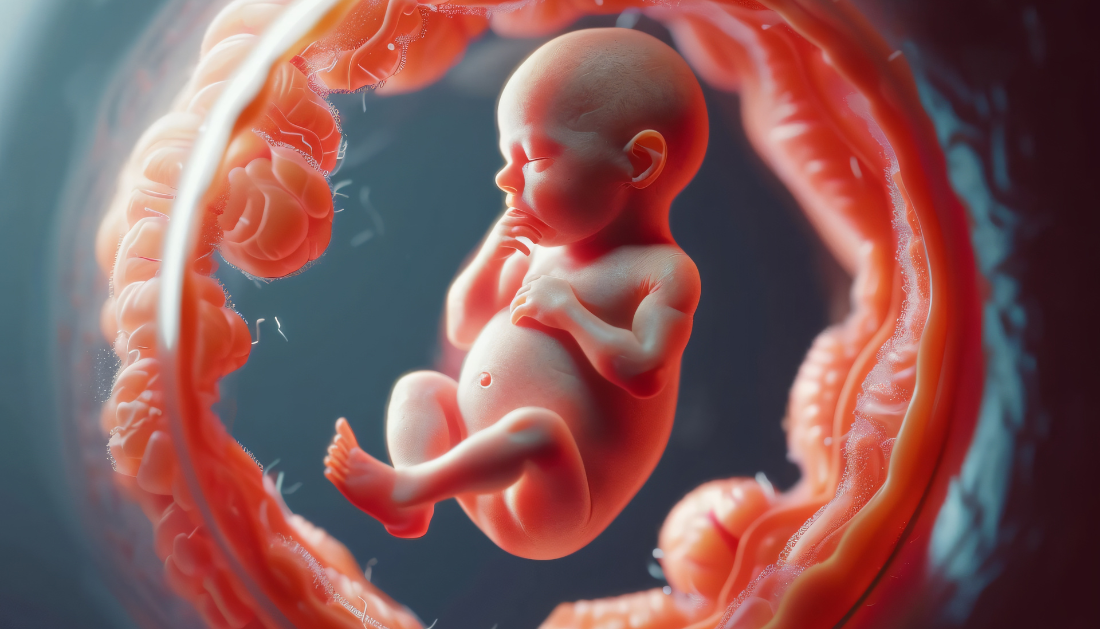

Researchers have assessed the effects of maternal gut bacteria, specifically Bifidobacterium breve, in the mother’s gut during pregnancy on fetal brain metabolism in a study that was published in Molecular Metabolism.
Context
A severe condition known as fetal growth restriction (FGR) occurs when placental insufficiency during pregnancy prevents a fetus from developing to its full potential. Postnatal neurodevelopmental problems, including as learning difficulties, motor and cognitive dysfunction, and cerebral palsy, may arise from FGR.
The effects of pharmacological treatments, such as sildenafil citrate, heparin, and aspirin, on pregnancy outcomes are not always constant. Therefore, in order to prevent or minimize the negative effects of FGR, appropriate interventions are needed.
Targeting the mother gut microbiota with probiotics may result in specific changes in brain development during the perinatal period. The gut microbiome can influence behavior and brain function.
Previous studies have shown that administering three doses of Bifidobacterium breve to germ-free pregnant and non-pregnant mice causes the placenta to undergo structural changes, sustained gut colonization, and improved fetal development.
About the study
In this study, the question of whether changes in fetal brain growth and metabolism were correlated with the amount of Bifidobacterium breve UCC2003 in the mother’s gut was explored.
Researchers both with and without Bifidobacterium breve UCC2003 colonized germ-free pregnant mice. C57BL/6J mice were administered 100 mL of reconstituted lyophilized B. breve (BIF group) or a control (PBS, GF group) via oral gavage on gestational days 10, 12, and 14.
For the purposes of reverse transcription, real-time polymerase chain reaction (PCR), and assessing the expression of cellular, metabolic, and axonogenesis genes, the team extracted fetal brain ribonucleic acid (RNA).
Using their prior biobank samples, researchers measured the messenger RNA (mRNA) expressions of important genes involved in cell cycle progression, growth, microglial activity, and neurogenesis in order to examine the molecular processes of B. breve.
They assessed the mRNA levels of solute carrier family-2 member 1 (Slc2a1) and Slc2a3 genes, which encode glucose transporter protein type 1 (GLUT1) and GLUT3, respectively, in embryonic brain tissue. These genes are involved in the absorption and metabolism of branched-chain amino acids in the embryonic brain.
Western blotting was used to separate brain proteins, and nuclear magnetic resonance (NMR) spectroscopy was used to examine fetal brain metabolites. Fetal sex was determined by the detection of the sex-determining region Y gene (SRY).
In order to better understand brain functions such cellular growth, proliferation, survival, nutrition absorption, dendritic structure, neuronal development and differentiation, astrogliogenesis, and cell fate transition, researchers looked at signaling pathways.
In lysates taken from the fetal brain, they looked at the concentrations of pyruvate dehydrogenase kinase 1 (PDHK1) and hypoxia-inducible factor-1alpha (HIF-1α) and HIF-2α.
Through the examination of oxidative phosphorylation (OXPHOS) complexes, they evaluated the capacity of mitochondria to produce adenosine triphosphate (ATP). For analysis, they employed linear mixed models and general linear models.
In summary
The results of the study demonstrated that the oral intake of probiotics by the mother during her pregnancy, particularly Bifidobacterium breve, had a substantial effect on fetal organogenesis, influencing axonogenesis pathways, cell development, and brain metabolism.
Through microbiota-focused therapy, the bifidobacterium can enhance fetal growth and gestational health.
While structural and histological investigation could reveal alterations in cell division, cell death, and axon formation, in vitro and animal studies could clarify causes. Postnatal research, such as behavioral studies, may be used to evaluate B. breve’s effects on neurocognition.
For more information: Maternal gut Bifidobacterium breve modifies Q1,8 fetal brain metabolism in germ-free mice, Molecular Metabolism, https://doi.org/10.1016/j.molmet.2024.102004
more recommended stories
 Statins Rarely Cause Side Effects, Large Trials Show
Statins Rarely Cause Side Effects, Large Trials ShowKey Points at a Glance Large.
 Anxiety Reduction and Emotional Support on Social Media
Anxiety Reduction and Emotional Support on Social MediaKey Summary Anxiety commonly begins in.
 Liquid Biopsy Measures Epigenetic Instability in Cancer
Liquid Biopsy Measures Epigenetic Instability in CancerKey Takeaways Johns Hopkins researchers developed.
 Human Antibody Drug Response Prediction Gets an Upgrade
Human Antibody Drug Response Prediction Gets an UpgradeKey Takeaways A new humanized antibody.
 Pancreatic Cancer Research: Triple-Drug Therapy Success
Pancreatic Cancer Research: Triple-Drug Therapy SuccessKey Summary Spanish researchers report complete.
 Immune Cell Epigenome Links Genetics and Life Experience
Immune Cell Epigenome Links Genetics and Life ExperienceKey Takeaway Summary Immune cell responses.
 Dietary Melatonin Linked to Depression Risk: New Study
Dietary Melatonin Linked to Depression Risk: New StudyKey Summary Cross-sectional analysis of 8,320.
 Chronic Pain Linked to CGIC Brain Circuit, Study Finds
Chronic Pain Linked to CGIC Brain Circuit, Study FindsKey Takeaways University of Colorado Boulder.
 New Insights Into Immune-Driven Heart Failure Progression
New Insights Into Immune-Driven Heart Failure ProgressionKey Highlights (Quick Summary) Progressive Heart.
 Microplastic Exposure and Parkinson’s Disease Risk
Microplastic Exposure and Parkinson’s Disease RiskKey Takeaways Microplastics and nanoplastics (MPs/NPs).

Leave a Comment